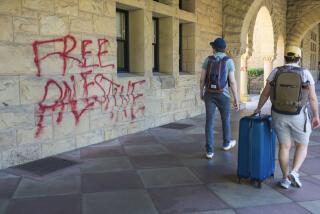Bonfire of the Profanities: Campus Thefts Protest Press : Offended activist groups are taking, even torching, stacks of papers. Officials keep their distance as free-speech issue burns.
- Share via
WASHINGTON — Working late at his law office one night last April, Penn State trustee Ben Novak was interrupted by his partner shortly after midnight.
“What’s going on out front?” he asked.
Startled, Novak rushed downstairs and opened the front door to see a bonfire on his office lawn fueled by hundreds of copies of the Lionhearted, a biweekly student newspaper Novak had helped start at Penn State in 1989.
After extinguishing the flames, Novak reached into the ashes and pulled out an unburned copy. The back page featured a doctored picture of a bikini-clad body attached to the face of a female columnist for the campus daily newspaper.
The Lionhearted took great pleasure in vexing campus feminists , but now the feminists had taken revenge.
The burned issues were a small portion of 5,000 removed from newsstands and dumped in trash bins that night, and a fraction of the tens of thousands of student newspapers taken in similar protests at colleges across the country last year.
“We usually hear of three or four newspaper thefts a semester,” said Mark Goodman, director of the Student Press Law Center in Washington. “This spring we had 16.”
In some cases, the papers were taken by pranksters or by individuals hoping to keep embarrassing stories from reaching the public. But almost half were carried out by campus activists, usually from the left side of the political spectrum, who disagreed with the papers’ opinions.
The most widely publicized theft occurred at the University of Pennsylvania in April, when black students trashed 14,000 copies of the Daily Pennsylvanian because they were unhappy with a conservative columnist.
Other politically motivated thefts occurred at Yale, North Carolina State, Dartmouth, Florida State, Georgia and Southeastern Louisiana. Most college papers are vulnerable to mass confiscation because they are set out in stacks around campus, where students can pick up copies free.
Those who sympathize with the students who took the papers view it as a valid means of protest. “The individual(s) who burned copies of the Lionhearted were demonstrating the same freedom of expression that allowed the newspaper to print its views,” said a June editorial in the Penn State Daily Collegian, the mainstream campus daily.
But to others, stealing stacks of papers is censorship, plain and simple.
“If universities stand for anything, they have to stand for the right of people to express their ideas,” said Steven Shapiro, associate legal director for the American Civil Liberties Union. “Freedom of the press includes freedom to distribute the press.”
Compounding the injustice, some say, is the reaction of college administrators who, for the most part, have been reluctant to discipline those responsible.
“It’s an example of how weak their appreciation for free expression and free press is,” Goodman said. He points to Dartmouth College in New Hampshire, home of the conservative Dartmouth Review, as a prime example.
Last April, the Review, a popular weekly that has been needling campus liberals for 13 years, wrote about the assault of a woman in a campus Afro-American Society house. Titled “Good Times,” the article said the accused assailant had just won a minority scholarship, and noted sarcastically that the suspect’s arrest “adds much to the diversity of this pool of scholars.”
A group calling itself the Black Freshman Forum posted placards around campus saying the Review’s “bigotry” would no longer be tolerated. For three weeks, members of the Forum confiscated most of the 3,500 Review copies distributed door-to-door in campus residence halls.
Review staffers hoped Dartmouth officials would condemn the act as a violation of campus free-speech codes, said Review editor Oron Strauss.
Instead, the university considered the matter “a distribution issue, not a free-speech issue,” Dean of Students Lee Pelton said in a recent interview. “It’s a newspaper and it has value, but we treat it as abandoned property. There’s no rule that says how many copies you can pick up.”
Strauss says administrators were afraid they would be labeled as racist if they confronted the group. “If this were a case of Dartmouth Review staffers going around picking up a newspaper distributed by black students, we would probably get thrown out of school,” Strauss said.
Other student publications have bypassed college administrators and gone straight to campus police.
Mark Morice, a former student body president at Southeastern Louisiana University, is expected to go on trial later this month for allegedly prompting fraternity friends to steal thousands of copies of the campus daily. The stolen issues featured an article critical of Morice’s presidency.
After the paper’s editor, Dori Colona, filed a criminal complaint, Southeastern President Warren Smith sent her a letter subtly urging her to be more forgiving.
“My main thing is I want the university to acknowledge that something wrong has been done,” Colona said in an interview. “They haven’t done that.”
More to Read
Sign up for Essential California
The most important California stories and recommendations in your inbox every morning.
You may occasionally receive promotional content from the Los Angeles Times.










